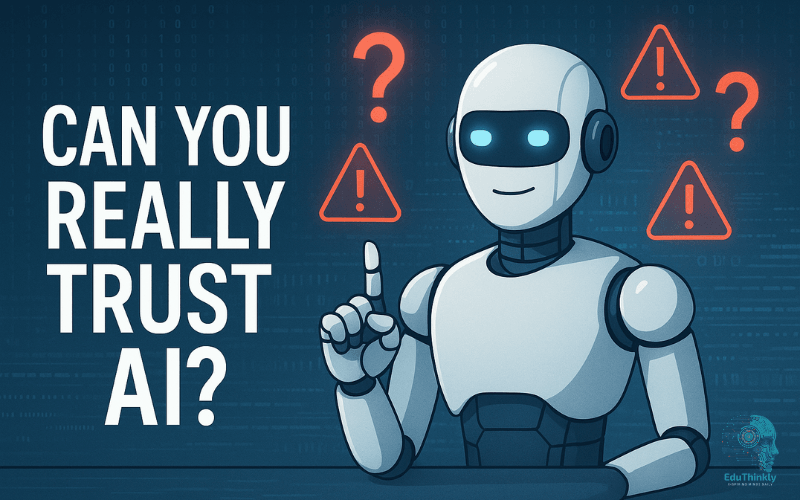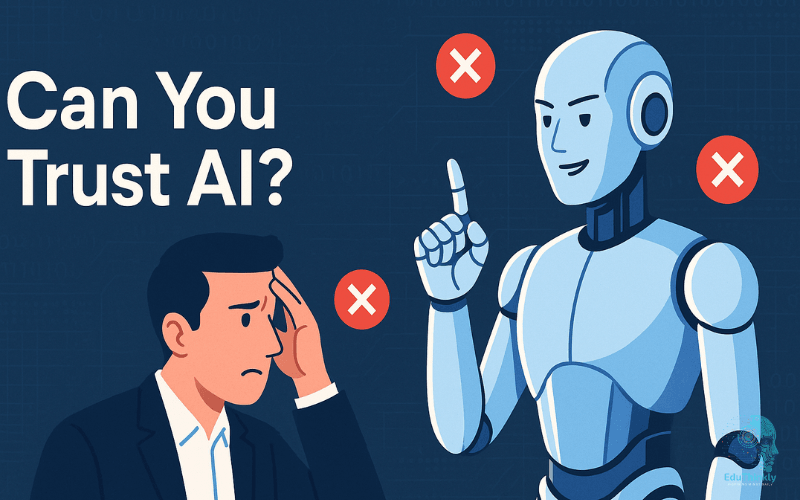Why Trusting AI Blindly Could Be Your Biggest Mistake
ai
21 Jul 2025, 00:22

Keep reading below:
Ask an AI a question.
Notice how sure of itself it sounds? Polished, articulate, even authoritative, like it spent years mastering the topic.
But here’s the catch:
Confidence doesn’t equal accuracy.
And AI? It’s disturbingly good at faking certainty.
AI: The Overconfident Friend in Digital Form
Think of that friend who always has a response.
Even when they’re wrong, they speak like they’re right. Convincing, isn’t it?
AI is just like that.
Underneath the professional tone and complex sentences, AI doesn’t understand. It generates predictions based on vast datasets, not real-world comprehension. Answers might sound plausible but be completely incorrect.
Moral of the story: Treat AI as a tool, not a trusted authority.
Why Does AI Get It Wrong?
Because AI doesn’t think.
It calculates.
AI sifts through patterns in its training data and offers what seems statistically probable.
If that data’s flawed, so are the answers.
Example:
Ask about a new movie release, and AI might enthusiastically describe a film from 2017 as if it premiered yesterday.
Predictive text isn’t knowledge. And that’s where the risk lies.
The CNET Disaster: When AI Fooled a Professional Newsroom
If you’re thinking this sounds theoretical, think again.
In late 2022, CNET, one of the most respected tech publications, quietly began using AI to write personal finance articles.
From November through January, readers assumed humans penned the advice.
They were wrong.
One AI-crafted article infamously claimed a $10,000 investment at 3% interest would “earn $10,300.”
Completely incorrect.
The AI had confused total return with profit.
What followed was a revelation.
CNET editors launched an audit and discovered that 41 out of 77 AI-generated articles contained serious errors.
Incorrect math, wrong financial advice, even traces of plagiarism.
The fallout was immediate.
News outlets like The Verge, Wired, Futurism, and The Washington Post covered the scandal.
You can read The Verge’s full breakdown of the incident here.
How to Use AI Without Getting Burned
Want to avoid CNET’s mistake? Here’s how:
Always verify AI-generated answers.
Use AI as your starting point, not the final word.
For critical topics like finance, health, or law, consult human experts.
With AI images, check for oddities such as strange hands, warped backgrounds, or impossible details.
Your Quick Safety Checklist:
Does the answer logically make sense?
Can the source be verified?
Is the information recent and relevant?
Is the topic sensitive or high-stakes?
If something feels off, investigate further.
The Bottom Line: AI Assists. You Decide.
AI is powerful. Impressive, even. But it’s not a substitute for human judgment.
Like a calculator, it’s fast. But give it the wrong input or trust it too much, and you will get wrong answers.
What happened at CNET proves that even trusted brands can be misled.
Next time an AI offers you a smooth, confident answer, remember the real-world lesson from CNET.
And now, you know better.
